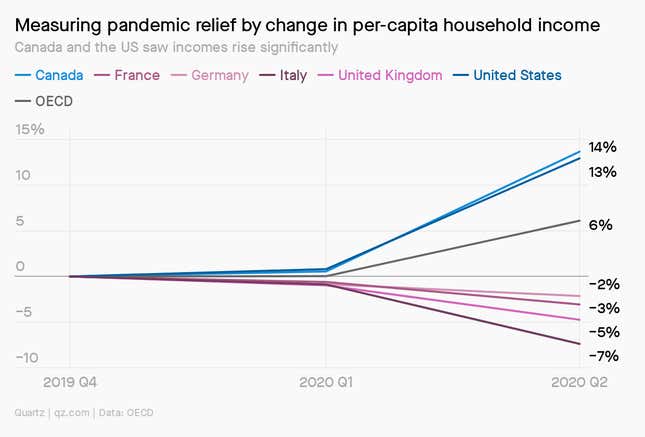Good morning, Quartz readers!
Here’s what you need to know
The UK starts rolling out Covid-19 vaccines… Older adults, frontline medical workers, and care home staff will be the first to receive the Pfizer/BioNTech vaccine.
…as India speeds up its review process… The Serum Institute filed for emergency use authorization for the AstraZeneca vaccine on Monday, while Pfizer reportedly applied over the weekend.
…and Sinovac works to double its capacity. The Chinese vaccine maker said a new facility will enable it to increase production to 600 million doses annually by the end of the year.
Japan plans another $700 billion in stimulus. The latest package includes line items for controlling the coronavirus as well as initiatives to prop up the economy post-pandemic.
Davos 2021 won’t be in Davos. The World Economic Forum is temporarily moving its annual meeting to Singapore in May due to the country’s low rate of Covid-19 cases, before returning to Switzerland in 2022.
The retooled Hang Seng had a rocky first day. On Monday, the newest additions to Hong Kong’s main equity benchmark index—Meituan, a Chinese food delivery app; Budweiser Apac; and Anta Sports, a Chinese sports equipment company—ended the day lower as stocks fell 1.2% overall.
China’s trade surplus hit a new record. While the previous record in May resulted from a drop in imports, the November tally was driven by a 21% increase in exports—notwithstanding a 13% decline in exports to India in the first 11 months of the year.
What to watch for
“With the world in dire need of Covid-19 drugs and vaccines, the biopharmaceutical industry has a once-in-a-generation opportunity to reset its reputation.” —Eli Lilly’s CEO, Dave Ricks, during a second-quarter earnings call
In a September 2019 Gallup survey, 58% of Americans held a negative view of the pharmaceutical industry; only the federal government scored worse. But heightening vaccine buzz is likely to bring about a change in public opinion. While drugmakers won’t make a ton of money from this vaccine (at least not right away), the reputation points they score could be worth their weight in gold.
Charting pandemic relief impact
Adding to months of stalled talks, the US Congress failed over the weekend to agree on legislation to bolster the American economy, although the governing body is expected to pass a stopgap relief plan alongside a broader funding bill on Friday. Relief couldn’t come soon enough: Similar pandemic measures in the spring made a big impact.

US pandemic relief also proved more generous than more automated stabilizers deployed in some European economies, in part because those measures are more targeted at maintaining living standards than America’s fiscal firehose.
Bullish or bearish
👎 Bearish on blockchain’s promise. Technology whizzes have spent years trying to use bitcoin’s blockchain architecture for other applications in finance, but so far blockchain companies have produced more press releases than viable enterprises. According to DocuSign CEO Daniel Springer, blockchain is still too expensive for the kinds of things his company does.
👍 Bullish on the bitcoin model. Using cryptocurrency to achieve environmental goals seems equally elusive, but Apple co-founder Steve Wozniak is optimistic. His new company WOZX, launched by the energy-efficiency crowdfunding company Efforce, entitles holders to a share of profits from energy efficiency projects around the world. But will it work?
✦ You know what else we’re bullish on? A Quartz membership. Sign up today for a seven-day free membership trial.
Surprising discoveries
We’ve got another monolith. A fifth metal structure popped up on the UK’s Isle of Wight, while a US artist group hinted it might be responsible for them all.
A new high powered telescope has uncovered “ghostly circles.” Astronomers are so baffled they called the radio signals “WTF” at first.
Breakdancing is coming to the Olympics. For the Paris Games in 2024, the International Olympic Committee also confirmed skateboarding, sport climbing, and surfing.
They wish they were a little bit taller. Every year, hundreds of people get a painful and controversial surgery to extend the length of their legs.
Japan is subsidizing AI matchmakers. The government is allocating $19 million next year to local matchmaking programs that use artificial intelligence, part of an effort to combat the nation’s declining birth rate.
Our best wishes for a productive day. Please send any news, comments, unexplained space signals, and AI-enabled meet-cutes to hi@qz.com. Get the most out of Quartz by downloading our iOS app and becoming a member. Today’s Daily Brief was brought to you by John Detrixhe, Michael Coren, Tim Fernholz, Kira Bindrim, Liz Webber, and Susan Howson.